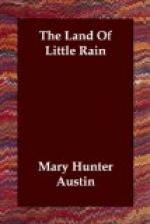All that storms do to the face of the earth you may read in the geographies, but not what they do to our contemporaries. I remember one night of thunderous rain made unendurably mournful by the houseless cry of a cougar whose lair, and perhaps his family, had been buried under a slide of broken boulders on the slope of Kearsarge. We had heard the heavy denotation of the slide about the hour of the alpenglow, a pale rosy interval in a darkling air, and judged he must have come from hunting to the ruined cliff and paced the night out before it, crying a very human woe. I remember, too, in that same season of storms, a lake made milky white for days, and crowded out of its bed by clay washed into it by a fury of rain, with the trout floating in it belly up, stunned by the shock of the sudden flood. But there were trout enough for what was left of the lake next year and the beginning of a meadow about its upper rim. What taxed me most in the wreck of one of my favorite canons by cloudburst was to see a bobcat mother mouthing her drowned kittens in the ruined lair built in the wash, far above the limit of accustomed waters, but not far enough for the unexpected. After a time you get the point of view of gods about these things to save you from being too pitiful.
The great snows that come at the beginning of winter, before there is yet any snow except the perpetual high banks, are best worth while to watch. These come often before the late bloomers are gone and while the migratory birds are still in the piney woods. Down in the valley you see little but the flocking of blackbirds in the streets, or the low flight of mallards over the tulares, and the gathering of clouds behind Williamson. First there is a waiting stillness in the wood; the pine-trees creak although there is no wind, the sky glowers, the firs rock by the water borders. The noise of the creek rises insistently and falls off a full note like a child abashed by sudden silence in the room. This changing of the stream-tone following tardily the changes of the sun on melting snows is most meaningful of wood notes. After it runs a little trumpeter wind to cry the wild creatures to their holes. Sometimes the warning hangs in the air for days with increasing stillness. Only Clark’s crow and the strident jays make light of it; only they can afford to. The cattle get down to the foothills and ground inhabiting creatures make fast their doors. It grows chill, blind clouds fumble in the canons; there will be a roll of thunder, perhaps, or a flurry of rain, but mostly the snow is born in the air with quietness and the sense of strong white pinions softly stirred. It increases, is wet and clogging, and makes a white night of midday.
There is seldom any wind with first snows, more often rain, but later, when there is already a smooth foot or two over all the slopes, the drifts begin. The late snows are fine and dry, mere ice granules at the wind’s will. Keen mornings after a storm they are blown out in wreaths and banners from the high ridges sifting into the canons.




